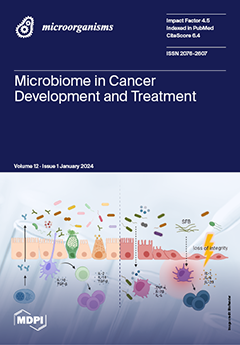In dogs, tick infestation can cause damage ranging from a simple skin irritation to severe diseases and/or paralysis leading to animal death. For example,
Ixodes ricinus and
I. scapularis are among the tick species incriminated the most in the transmission of
Borrelia burgdorferi, the agent of human and canine Lyme borreliosis (LB). In this study, we aimed to compare the efficacy of two products designed for dogs—an oral systemic ectoparasiticide and a topical repellent ectoparasiticide—against the acquisition of
B. burgdorferi by adult
I. scapularis and
I. ricinus using an ex vivo model. Thirty-two beagle dogs were included in a parallel-group-designed, randomized, single-center, negative-controlled efficacy study. The dogs were allocated to three groups based on gender and body weight: a fluralaner (F, Bravecto
®) treatment group (
n = 8), administered a single oral treatment on day 0 at the recommended dose; a dinotefuran–permethrin–pyriproxyfen (DPP, Vectra
® 3D) treatment group (
n = 8), topically treated on day 56 at the recommended dose; and an untreated control group (
n = 16). Blood and hair were collected from each dog on days 58, 63, 70, 77, and 84. Hair was added to the silicone-based membrane separating two glass chambers forming the feeding unit (FU). Chamber 1 was filled with blood spiked with
B. burgdorferi sensu stricto, strain B31 (10
5 cells/mL). Chamber 2, glued below chamber 1, was seeded with 20 adult
I. scapularis or
I. ricinus. The FUs (
n = 240) were incubated at 37 °C with a humidity >90%. Tick survival, attachment, and feces presence were observed from 1 h up to 72 h after tick seeding. The uptake of
B. burgdorferi was determined in ticks using nested polymerase chain reaction (nPCR). The acaricidal efficacy of DPP-treated hair was 100% within 1 h of tick release on every study day for both
I. ricinus and
I. scapularis. The speed of kill associated with DPP was sufficiently fast to prevent tick attachment and engorgement, and, consequently, to prevent the acquisition of
B. burgdorferi. In the F-treated group, the acaricidal efficacy observed at 12 h, throughout the study, was <20% and <28% for
I. scapularis and
I. ricinus, respectively. Furthermore, tick feces were observed in the FUs, and several female ticks (
I. scapularis (
n = 55) and
I. ricinus (
n = 94)) tested positive for
B. burgdorferi. The results provide proof of concept for the use of an ex vivo model based on an artificial feeding system to compare two ectoparasiticides against the acquisition of
B. burgdorferi by
I. ricinus and
I. scapularis. In addition, our results demonstrate the superiority of DPP compared to F in the speed of acaricidal activity against ticks, as well as in preventing the acquisition of
B. burgdorferi.
Full article






